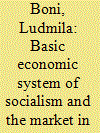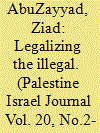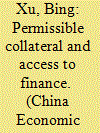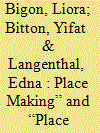|
|
|
Sort Order |
|
|
|
Items / Page
|
|
|
|
|
|
|
| Srl | Item |
| 1 |
ID:
189305


|
|
|
|
|
| Summary/Abstract |
The recognition by the Chinese academic community of the commodity economy's right to exist in a planned economy, as well as the possibility of market development under socialism, was a major breakthrough in the history of Marxism. Socialism in conjunction with the market marked the beginning of the formation of the socialist market economy system in the PRC and the development of a mixed economy. In addition, the principle of "public ownership as the basis for the joint development of economies of multiple forms of ownership" was named as the basic economic system of the country at the initial stage of socialism development. Today, it is officially called one of the most important advantages of the system of socialism with Chinese characteristics. It is this advantage, according to China, that has enabled high rates of economic growth and made the country one of the world's leading economies. But this unique feature and advantage of socialism with Chinese characteristics can be manifested and realized only within a certain coordinate system - namely, an overarching system of state administration in which the basic economic system is responsible for managing the development of the country's economy at the institutional level.
|
|
|
|
|
|
|
|
|
|
|
|
|
|
|
|
| 2 |
ID:
138325


|
|
|
|
|
| Summary/Abstract |
The Israeli High Court’s decision, issued April 15, 2015, to apply the Absentee Property Law of 1950 to properties in East Jerusalem owned by Palestinians living in the West Bank, considering them absentee property, is nothing more than another tool to allow the occupation to loot Palestinian property, in the West Bank in general and in Jerusalem in particular, for the benefit of Jewish Israeli citizens.
|
|
|
|
|
|
|
|
|
|
|
|
|
|
|
|
| 3 |
ID:
170098


|
|
|
|
|
| Summary/Abstract |
By allowing large classes of movable assets to be used as collateral, the Property Law reform transformed the secured transactions in China. Difference-in-differences tests show firms operating with ex-ante more movable assets expand access to bank credit and prolong debt maturity. However, the reform does not seem to improve the efficiency of credit allocation, as debt capacity of ex-ante low quality firms expands the most following the reform. Credit expansion also does not lead to better firm performance. These findings are not driven by confounding factors such as improvements in creditor and property rights protection. Our results also cannot be explained by other important reforms which were introduced around the same time as the introduction of the Property Law. These include anti-tunneling and split-share reforms and amendments to the corporate tax structure in China. We conduct explicit robustness tests for these other reforms and hence contribute to the empirical literature on the reform process in China with new findings.
|
|
|
|
|
|
|
|
|
|
|
|
|
|
|
|
| 4 |
ID:
188945


|
|
|
|
|
| Summary/Abstract |
This article expands on the usability of the concepts of “place making” and “place attachment” as recently developed in urban studies research in the context of housing insecurity of marginalized communities in today’s neo-liberal city. Particularly, against the growing threat of urban evictions, the article utilizes a transdisciplinary approach, showing the relevance of both concepts for (a) a better understanding of bottom-up processes of spatial production and attempts to create a sense of place on the part of such communities, and (b) offering an innovative legal strategy for doing justice to these communities in terms of their compensation rights, especially where a title to land has not been registered on a private basis. These issues are critically examined on the site-related case of the Givat-Amal quarter in Tel Aviv, Israel. This district is now under actual final threat of forced evictions following seven conflicted decades with the state, municipal authorities and private entrepreneurs. Our transdisciplinary study is based on qualitative methodologies in human geography such as fieldwork, visual evidence, and interviews, with a glimpse into philosophy. It is equally based on revisiting “traditional” legal property rights through the lens of post-liberal human rights analysis. The argument can apply to many situations of forced evictions across Africa, Latin America, and the West itself.
|
|
|
|
|
|
|
|
|
|
|
|
|
|
|
|
| 5 |
ID:
088012


|
|
|
|
|
| Publication |
2009.
|
| Summary/Abstract |
This paper examines the broad range of informal land transactions and arrangements migrants are entering into with customary landowners to gain access to customary land for export cash cropping in the oil palm belt of West New Britain, Papua New Guinea. Whilst these arrangements can provide migrants with relatively secure access to land, there are instances of migrants losing their land rights. Typically, the land tenure arrangements of migrants with more secure access to land are within a framework of property rights for social inclusion whereby customary landowners' inalienable rights to land are preserved and the 'outsider' becomes an 'insider' with ongoing use rights to the land. Through socially embedding land transactions in place-based practices of non-market exchange, identities of difference are eroded as migrants assume identities as part of their host groups. This adaptability of customary land tenure and its capacity to accommodate large migration in-flows and expanding commodity production undermines the argument common amongst proponents of land reform that customary tenure is static and inflexible. Before such claims are heeded, there must be more detailed empirical investigations of the diverse range of land tenure regimes operating in areas of the country experiencing high rates of immigration.
|
|
|
|
|
|
|
|
|
|
|
|
|
|
|
|
|
|
|
|
|